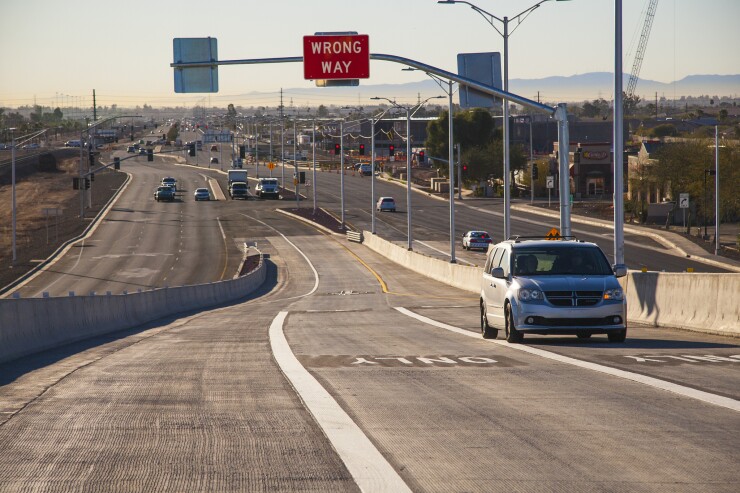DALLAS – A group of Democrats, mostly in the House, countered President Trump’s $1 trillion infrastructure renewal program with a proposal for $2 trillion of direct federal infrastructure funding that would be paid for by closing corporate tax loopholes and enacting other tax reforms.

The 21st Century New Deal for Jobs plan unveiled by the Congressional Progressive Caucus (CPC) at a news conference on Thursday would fund infrastructure projects with a new tax on Wall Street transactions and by requiring corporations to pay federal income tax on overseas profits that are currently exempt from taxation until the money is repatriated to the U.S.
The proposal would fund a wide range of transportation projects, along with upgrades to water and sewer systems, veterans hospitals, and high-speed Internet, while creating 2.5 million jobs, the coalition said.
The 10-year, $2 trillion plan includes $770 billion for transportation projects, including $390 billion for roads, $350 billion for public transit and intercity rail, and $30 billion for ports and airports.
More than $200 billion of the road and bridge funding would be allocated to local and rural transportation efforts, with $2 billion set aside for roads on tribal lands, the CPC said.
The CPC plan would provide a total of $100 billion for schools, $100 billion for high-speed broadband technology, $30 billion for veterans hospitals, $20 billion for infrastructure on public land, and $10 million for renovation of Indian health service facilities.
Rep. Ted Lieu, D-Calif., who is spearheading the plan, said the CPC’s 21st Century New Deal for Jobs proposal would address the nation’s infrastructure needs without taking away existing legal protections for workers and the environment.
“The critical investments included in our New Deal for Jobs are fully paid for by closing corporate tax loopholes and ensuring that Wall Street contributes its fair share toward rebuilding America,” Lieu said.
“To fund infrastructure projects, President Trump’s relatively small and incoherent plan would use irresponsible tax gimmicks that benefit Wall Street at the expense of taxpayers,” Lieu said. “My colleagues and I know that Americans cannot afford to settle for this scam.”
The Trump administration’s budget request released on Tuesday includes $200 billion of federal outlays over nine years to support another $800 billion of proposed private/public infrastructure investment. The infrastructure funding would begin at $5 billion in fiscal 2018, peak at $50 billion in fiscal 2021, and then be phased back to $5 billion per year in fiscal 2025 and 2026.
“President Trump and congressional Republicans are pushing a trillion-dollar corporate giveaway that would create tax incentives for Wall Street to privatize our roads, bridges, sanitation systems, and utilities, while raising tolls, fees, and bills — all through taxpayer subsidies,” the CPC said in an accompanying fact sheet. “We cannot afford to accept a plan that helps Wall Street investors but leaves ordinary Americans behind.”
Infrastructure funding in the CPC proposal for fiscal 2018 totals $200 billion.
Expenditures in 2018 would include $39 billion for roads and bridges, $35 billion for transit and intercity rail, $6 billion for roads and airports, $35 billion for water and wastewater projects, $10 billion for high-speed broadband, $10 billion for schools, $6 billion for affordable housing, $3 billion for Veterans Affairs facilities, $3.5 billion for roads and other projects on tribal and federal lands, and $2.5 billion to protect infrastructure from natural disasters and cyber attacks.
Sen. Bernie Sanders, I-Vt., is the only senator in the 75-member progressive caucus, which was founded in 1991. The CPC is the largest bloc within the House Democratic Caucus.
In a alternative People’s Budget released in March, the CPC proposed to bolster the Highway Trust Fund with revenues from a tax on crude oil of $10.25 for each barrel that is refined into gasoline.





